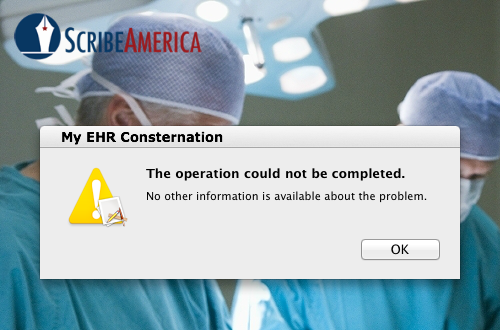In my opinion, EHR’s follow that old business school maximum, the 80/20 rule also known as the Pareto principle, but with a twist. Rather than 20 percent of an event causing 80 percent of its consequences, in this case it’s that 80 percent of medical providers do not like EHRs, while 20 percent do, but those are the folks who typically don’t use them.
Clickologists
I’ve witnessed my physician colleagues lament that EHR’s have made them inefficient care providers and turned them into so-called “clickologists.” That’s a catchy term I once heard uttered by Dr. Michael Granovsky at an ACEP Reimbursement and Trends Conference, but it’s an appropriate one. With EHRs typically a physician spends as much or more time looking at their computer screen as they do looking at patients.
Before you start to think this is an attack on EHRs let me say that they have plenty of positives. In all honestly I much prefer the ease of looking up a patient’s past medical history digitally. The alternative of calling the medical records department to request a patient file, which inevitably arrives an hour later weighing 20 pounds, just seems so old fashioned. Not to mention attempting to decipher the handwriting of previous physicians. We physicians apparently do have notoriously illegible handwriting.
The EHR Guilt
Despite the protests, my physician colleagues appear to have been taken in by EHRs. It’s not very surprising really. Like good soldiers, self-sacrifice is what was exhorted upon us in medical school, then again in residency, and once more when we first “arrived” as attendings; self-immolation anyone?
The problem with this nowadays is that physicians feel a sense of guilt regarding EHRs. The task of manually tracking every little thing about a patient interaction truly takes you out of the patient encounter. This mandatory data entry turns what should be a meaningful, comforting interaction for the patient, into a transaction.
To not mince words, EHRs contaminate the purest form of medicine.
EHR support staff
These voices have been heard and some have adapted to it by optimizing their practice with incentive models and/or different forms of support, the most popular among which are medical scribes.
Some administrators might scoff at the idea of needing to spend more money on top of the potential millions of dollars they just spent to install their new EHR system. But those administrators do not realize that scribes can actually increase their bottom line and when they’re in crisis mode dealing with huge patient wait times and a staff of unhappy doctors who never signed up to be “clickologists”, they might think a little bit different.
Experts advise practices and hospitals to be prepared for at least an initial 30 percent drop in productivity with EHRs, but real world experience says that number can sometimes be as high as 50 percent or worse. EHR vendors will also state that you will regain your productivity in six months, are you serious, six months! Thanks to ACEP they squashed this nonsense. Also, what could you do with six months of lost revenue? But medical scribes help things run smoother during the EHR transition period and beyond.
From clickologist back to physician
Of course beyond the better productivity numbers, scribes help doctors get back to their original job description, and free them of that guilt of not being truly present during patient interactions.
Just because your practice or hospital is moving to an EHR system, does not mean you are sentenced to become a “clickologist.” With or without the help of medical scribes you can solider through like they taught us, and make the 80/20 rule for EHRs work in your favor rather than against you.



